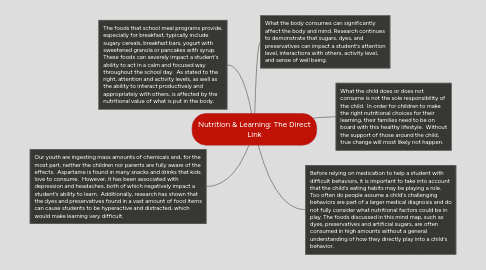Nutrition & Learning: The Direct Link
by Kelly Paris

1. The foods that school meal programs provide, especially for breakfast, typically include sugary cereals, breakfast bars, yogurt with sweetened granola or pancakes with syrup. These foods can severely impact a student's ability to act in a calm and focused way throughout the school day. As stated to the right, attention and activity levels, as well as the ability to interact productively and appropriately with others, is affected by the nutritional value of what is put in the body.
2. Our youth are ingesting mass amounts of chemicals and, for the most part, neither the children nor parents are fully aware of the effects. Aspartame is found in many snacks and drinks that kids love to consume. However, it has been associated with depression and headaches, both of which negatively impact a student's ability to learn. Additionally, research has shown that the dyes and preservatives found in a vast amount of food items can cause students to be hyperactive and distracted, which would make learning very difficult.
3. What the body consumes can significantly affect the body and mind. Research continues to demonstrate that sugars, dyes, and preservatives can impact a student's attention level, interactions with others, activity level, and sense of well being.
4. Before relying on medication to help a student with difficult behaviors, it is important to take into account that the child's eating habits may be playing a role. Too often do people assume a child's challenging behaviors are part of a larger medical diagnosis and do not fully consider what nutritional factors could be in play. The foods discussed in this mind map, such as dyes, preservatives and artificial sugars, are often consumed in high amounts without a general understanding of how they directly play into a child's behavior.
5. What the child does or does not consume is not the sole responsibility of the child. In order for children to make the right nutritional choices for their learning, their families need to be on board with this healthy lifestyle. Without the support of those around the child, true change will most likely not happen.


